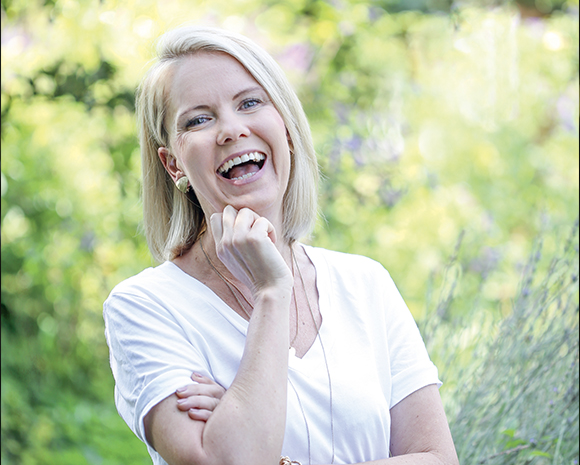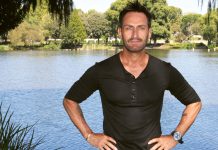Meet Tabitha Lage, co-founder of the Hope Risen Foundation – an incredible group started in 2009 with the vision of spreading love, hope and justice in a quest to end modern day slavery and exploitation. In Tabitha’s words, ‘Human trafficking isn’t just something that happens in places like Russia in Liam Neeson films’. It’s happening right here in South Africa, but organisations like Hope Risen are going a long way towards turning that reality into history.
The Hope Risen Foundation was founded in 2009. What inspired you to start this journey 10 years ago?
I was an ambassador for an NPO called Dress a Girl Around the World, where we went into very poor and vulnerable settlements and gave beautiful, handmade dresses to little girls who had never before worn something new that was just theirs. Over time, the leaders of these communities gave us feedback, and it became apparent that our label on the front of the dress deterred kidnappers – they thought these children were under our care, so they didn’t prey on them. They were safe. As I began to understand more about this situation, I was introduced to the reality of human trafficking happening right here on our doorstep. I was heartbroken, angry and horrified that anyone would buy a child for sex. I really felt called to start a foundation that would create awareness about the reality of human trafficking in South Africa. Little did I know that 10 years later we’d be involved in prevention, rescue, restoration and re-integration.
What would you say are some of the biggest misconceptions around human trafficking in SA and globally?
First off, one of the biggest is that it only happens overseas and not in this country, and also that it only happens in vulnerable and poor communities. That’s just not true – it can happen anywhere, and the more educated we are about the signs of human trafficking, the more likely we are to be able to identify it and report it to the police. It’s happening right at our street lights. There are also misconceptions that it doesn’t happen to men, which isn’t true – men are trafficked for labour purposes. People think there’s only sex trafficking, but we also deal with situations of organ trafficking, domestic servitude, forced impregnation, forced marriages and distortion of cultural practices. People also think kidnapping has to take place, but that’s also not true. Young people are particularly vulnerable to grooming processes where they can be forced into a dangerous situation. We also have to stop thinking just locally but also globally – sometimes these crimes are operated from Europe to South Africa and vice versa.
On that note, what do you wish more people knew about the state of this issue?
It’s important for people to know that not all trafficking occurs in the same way – the local context and specific situation determines who’s most at risk and how they’ll be exploited. There’s also not just one specific profile of a trafficker – South Africa is a source, transit and destination country for human trafficking. The Prevention and Combating of Trafficking in Persons Act was only signed off by President Zuma in July 2013, and passed in 2015. Human trafficking can also work in syndicate operations – a spotter, recruiter, buyer, seller, transporter, harbourer, financier, brothel keeper, pimp and clientele are all involved in one human trafficking situation. Many brothels are operating in South Africa, and many of the women working in the brothels are being exploited. I also wish people understood child trafficking and how easy it is for any of us to be fuelling this terrible industry. For example, most make-up has mica in it – it’s what gives it sparkle. But people don’t realise that mica is picked and packed by little girls in India who are forced into mines and use their small fingers to collect this ingredient.

The work you’ve done during this decade has certainly had a huge impact! What are some of your proudest moments?
There are proud moments every day! When you rescue a child from a sex trafficking ring and a year later, they’re smiling, talking, and enjoying life just like any other child should. When a woman spent years working in the sex trade and now proudly runs her own business and is able to legitimately provide for her daughter. When we’re able to reach many schools and children and educate them about this crime and so help to prevent them from being kidnapped and trafficked. Also, when we watch our volunteers and staff grow internally – the situations we face grow us, too. There are just so many moments to be proud of.
It’s incredibly inspiring to see the work you’ve done and your ability to retain hope. What’s next for the Hope Risen Foundation?
Hope has always been our biggest motivator to keep going, to keep fighting for the individual. One of our dreams is to build our own safe haven for women and children and that’s currently in the pipeline for 2020. We’ve been given land to enable us to build and provide a home of love and restoration for women and children. We’re also currently looking into setting up the foundation in Vietnam and possibly other international activities. Ultimately, our mission will always be to make a more beautiful, safe and hopeful world by ending human trafficking and exploitation, one day at a time.
Details: www.hoperisen.org; Facebook @hoperisenfoundation






